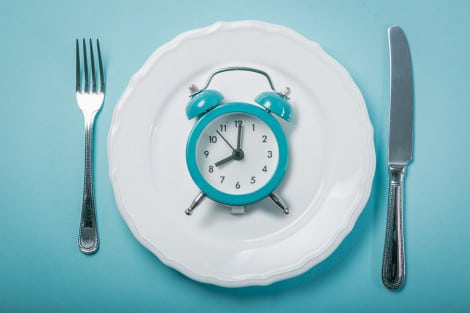Health Benefits of Fasting
Published on February 8, 2017 by Dr. Caitlin Gordon

When done correctly, there are numerous health benefits of fasting. Most of us envision the Master Cleanse or days on end drinking only water when we hear the word “fasting”. While there are many versions of fasting, some of the most beneficial fasts are as short as 12 hours. If you’re like me, and the idea of going more than a day without food seems nearly impossible, you can still reap the benefits of shorter fasts.
Types of Fasting
Intermittent Fasting
Intermittent fasting is a style of fasting that includes more frequent shorter fasts. These often last from 12-24 hours, and take place 1-2x per week. This is the most accessible type of fasting, and works best as a true caloric fast, meaning you only consume water or herbal tea during the fasting period.
Short-Term Fasts
Short fasts exclude solid food for anywhere from 24-72 hours. Short-term fasts can be composed of water, juices, or other liquid foods.
Long-Term Fasts
Long-term fasts are those lasting longer than three days, and up to three weeks. With longer fasts, it is important to have some caloric intake, as the body will suffer damage if starved of nutrition for long periods of time. Juice fasting, and other liquid diets are the safest way to perform longer fasts.
Health Benefits of Fasting
1. Brain Health
Fasting increases brain-derived neurotrophic factor (BDNF), an important component of healthy brain function. Low levels of BDNF are linked with depression and cognitive decline.
In rat studies, fasting increases the growth of new nerve cells. Fasting delayed the onset and severity of Alzheimer’s and reduced the incidence of Parkinson’s and other neurodegenerative diseases.
2. Immune Health
Several studies show intermittent fasting lowers oxidative stress. Oxidative stress is the primary cause of cell aging and death. Intermittent fasting works as an antioxidant to slow aging and extend life.
There is evidence that intermittent fasting reduces systemic inflammation markers. This is especially helpful for those suffering from autoimmune diseases, chronic pain, and depression.
Fasting stimulates autophagy, which is the cell’s waste clean-up program. This process helps the body use energy more efficiently and dispose of mutated or misfolded cells and proteins, reducing cancer risk and improving brain function.
2. Weight Loss & Blood Sugar Regulation
Fasting results in lower blood glucose levels and higher insulin sensitivity, which is essential for a healthy metabolism and weight loss. Reduced insulin sensitivity is the first stage of diabetes, and contributes to weight gain, fatigue, heart disease, and cancer.
Fasting increases secretion of human growth hormone (HGH). Higher levels of HGH burn more fat and help to increase muscle mass.
Ghrelin is the hormone that controls hunger, and fasting helps normalize ghrelin secretion so that we can more accurately assess when we are hungry.
Fasting reduces LDL cholesterol and triglyceride levels.
Tips for Successful Fasts
When: One of the easiest ways to enjoy the health benefits of fasting is by scheduling an intermittent fast one to two days per week. On these days you will eat dinner around 6 or 7pm, and then not eat again until the following day after 8am. You can gauge what time works best for breaking the fast. If you can last until lunchtime, then you will have fasted for 17 or 18 hours. This length of fast offers all the benefits outlined above.
What: While fasting, enjoy room temp or warm water, lemon water, or herbal teas. Herbal teas can help with a feeling of satiety (fullness), and curb cravings. If you are prone to feeling light headed or nauseated without breakfast, begin with shorter fasts. You may eat dinner earlier and breakfast closer to your normal time. Avoid caffeine, alcohol, and any caloric sweeteners or juices while fasting. Depriving the body of calories during the fast is an essential component of the benefits you experience.
help with a feeling of satiety (fullness), and curb cravings. If you are prone to feeling light headed or nauseated without breakfast, begin with shorter fasts. You may eat dinner earlier and breakfast closer to your normal time. Avoid caffeine, alcohol, and any caloric sweeteners or juices while fasting. Depriving the body of calories during the fast is an essential component of the benefits you experience.
Don’t fast if you are training 6 or more days per week, or under significant stress. Fasting is another stressor on the body. This type of controlled short-term stress can be very helpful; however, if you are already highly stressed it may do more harm than good.
How: Juice and liquid fast diets that include calories are appropriate for fasts lasting longer than a day or two, and these type of fasts should be tailored to your body. Eastern medicine sees the body holistically and explains why foods that might be energizing for one person, will cause heaviness and fatigue for another. By discussing your symptoms, and identifying your unique constitution, I can design a program where you will see faster and longer lasting results. For personalized recommendations of which foods you should consume during a longer fast, schedule an appointment below.
Interested in the health benefits of fasting?
The contents of this site, including text, graphics, images, and other material are for informational purposes only. Nothing contained in this site is or should be considered or used as a substitute for professional medical or mental health advice, diagnosis, or treatment. Please schedule an appointment for personalized health advice.






